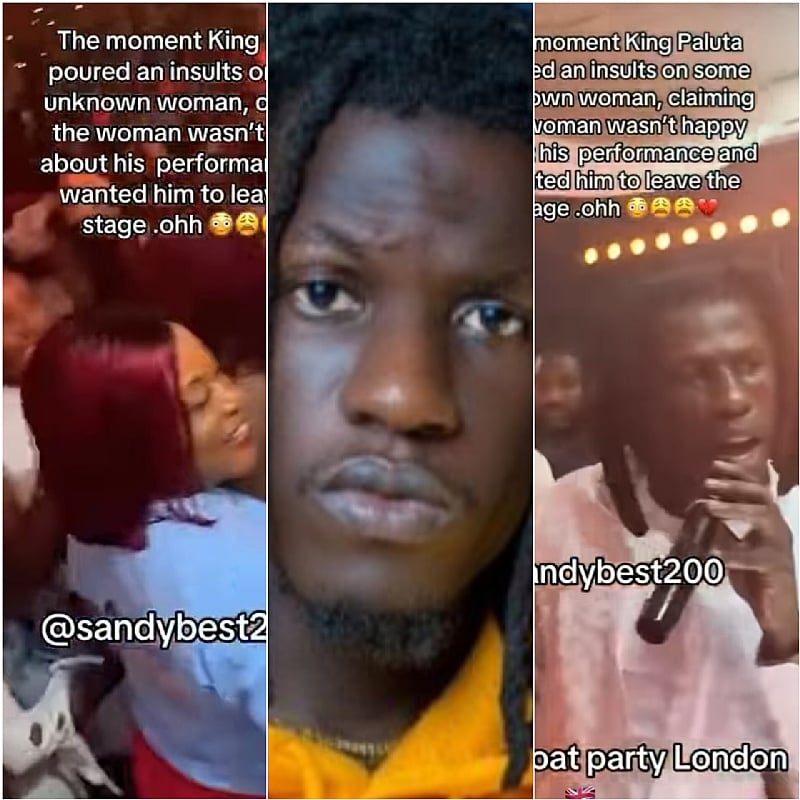The “All White Boat Party” in London became the stage for an unexpected confrontation between Ghanaian musician King Paluta and a female attendee, igniting a whirlwind of controversy that rippled across social media. The incident stemmed from the attendee’s apparent dissatisfaction with King Paluta’s performance, culminating in her gesturing for him to exit the stage. This seemingly innocuous act triggered a volatile response from the artist, transforming a festive occasion into a tense standoff. King Paluta, visibly agitated, paused his set to address the woman directly, resorting to insults and derogatory language. He publicly mocked her appearance, specifically her wig, adding a personal dimension to the already heated exchange. The incident, captured on video and subsequently shared online, rapidly gained traction, sparking a widespread discussion on artist-audience dynamics and the boundaries of acceptable conduct.
The video footage vividly portrays the unfolding drama. King Paluta’s initial reaction is one of disbelief, quickly escalating into anger. He pauses his performance mid-song, directing his attention and words squarely at the woman. The insults, clearly audible in the recording, range from calling her “foolish” to criticizing her choice of wig. Despite attempts by other attendees to intervene and de-escalate the situation, King Paluta remained resolute, asserting his need to “free his mind.” This insistence on expressing his displeasure, regardless of the public setting and potential repercussions, further fueled the controversy surrounding the incident. The video serves as a raw documentation of the events, providing a visual and auditory account of the exchange that sparked a heated public debate.
The incident ignited a firestorm of reactions on social media, with opinions sharply divided. Many criticized King Paluta for his unprofessional conduct, arguing that regardless of the perceived provocation, resorting to personal insults and derogatory language was unacceptable, especially in a public forum. They pointed out that as a performer, he had a responsibility to maintain a level of decorum and professionalism, even in the face of criticism. Conversely, others defended King Paluta, suggesting that the woman’s dismissive gesture was disrespectful and warranted a response. They argued that performers are also human and entitled to react to perceived disrespect, although some conceded that his response might have been excessive. This divergence in opinion underscores the complex interplay between artists and their audiences, raising questions about expectations, boundaries, and the appropriateness of public displays of disagreement.
The “All White Boat Party” incident amplified a broader conversation about the often-fraught relationship between performers and their audience. While performers often thrive on audience engagement and positive feedback, they are also vulnerable to criticism and negative reactions. This inherent vulnerability can create tension, particularly in live performance settings where interactions are immediate and unscripted. The incident highlighted the power dynamics at play, with the performer holding a position of authority on stage, yet also being subject to the judgment and reactions of the audience. This complex interplay can lead to misunderstandings and conflicts, as evidenced by the King Paluta incident.
The woman’s gesture, interpreted by King Paluta as a sign of disrespect, touched a nerve in the ongoing discourse about audience etiquette and the expectations placed upon performers. While artists often seek validation and appreciation from their audience, there’s an ongoing debate about the extent to which audience members are obligated to express enthusiasm or conceal their dissatisfaction. Some argue that attending a performance implies a certain level of respect for the artist and their work, regardless of personal preference. Others maintain that audience members are entitled to express their honest reactions, including negative ones, as long as it doesn’t disrupt the performance for others. The incident brought these differing perspectives into sharp relief, highlighting the delicate balance between artist expression and audience reception.
In the aftermath of the confrontation, King Paluta resumed his performance, choosing to launch into his song “For the Popping.” This seemingly defiant act added another layer of complexity to the narrative. While some interpreted it as a sign of resilience and a refusal to be deterred by negativity, others saw it as a dismissive gesture, further alienating those who disapproved of his earlier outburst. Despite the lingering tension, many attendees continued to enjoy the show, dancing and singing along to the music. This mixed reaction reflects the multifaceted nature of the incident and its impact on the overall atmosphere of the event. The “All White Boat Party” incident, inadvertently captured and disseminated on social media, became a case study in the dynamics of artist-audience interaction, the boundaries of acceptable behavior, and the power of online platforms to amplify and dissect such events.


